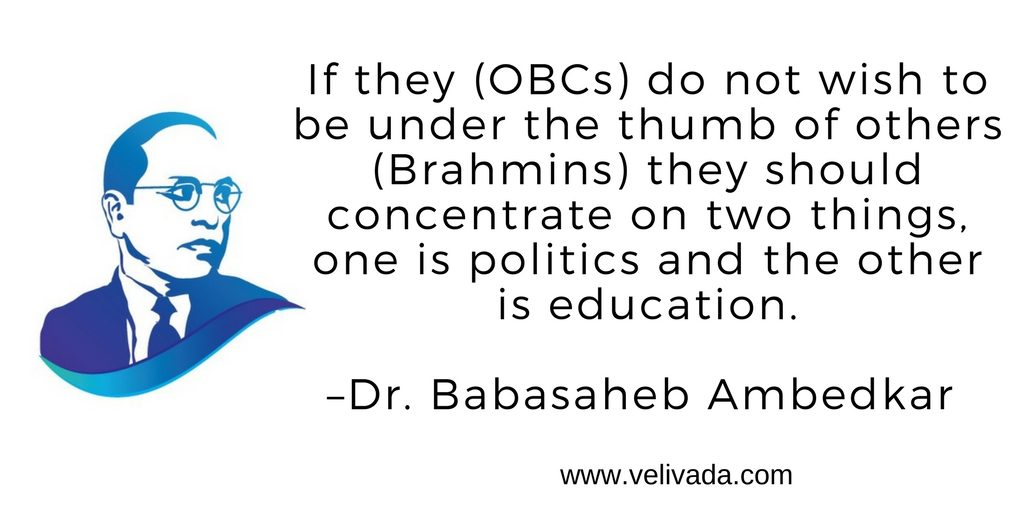
Babasaheb Ambedkar and His Significance to the OBCs
After the great Mahatma Phule started the non-Brahmin movement, it reached wide and far throughout India. At the time, the political process in India had not started and the elections started taking place in 1937. Most of the great leaders of the non-Brahman movement had joined the political parties, particularly, the non-Brahman movement leaders joined the Congress. The political refraction of the great social movement generated by Jotiba by the non-Brahman leaders weakened the OBC movement so considerably that Babasaheb Ambedkar had to comment that it was only left to him the fight of the Non-Brahman movement.
Read also – Dr. Babasaheb Ambedkar’s Message to OBCs – Which They Have Neglected
As the product of the movement of Jotiba and Shahu (the non-Brahman movement) and supported by the great OBC stalwart leaders like Dada Keluskar and enlightened princess like Sayaji Maharaj, Babasaheb was duty bound to strengthen the non-Brahmin movement. His quest to reach to the non-Brahman leaders failed due to politics of that time, but the Independent Labour Party had a strong OBC presence. He continued to strive for the OBCs and their representation. Unfortunately, the OBC members in the constitution assembly proved to be hacks of the Brahmins and Banias, and for the power of their own, they betrayed their communities. The leading name in this is Patel, who had a great chance to lead the Non-Brahman movement. But he did not do anything.
Read also – Babasaheb Ambedkar’s Contribution to the Scheduled Castes
In the constituent assembly, Babasaheb Ambedkar fought alone the battle of OBCs and if that was not enough he encouraged the OBC leaders to form All India Backward Classes Federation on 26th January 1950, the constitution came into being.
His theoretical contribution to liberate OBCs from the shackles of the Brahminical Hinduism can be seen in Who were the Shudras and Riddles in Hinduism.
Author – Mangesh Dahiwale



Mr. Mangesh Dahiwale, I read your article titled “Babasaheb Ambedkar and his significance to the OBCs” and after going through it, I have some questions that I want you to answer them.
Following are the questions :
1. On the basis of congress entry in 1930s, if non-bramhin leaders are to be accused, what about the congress, who co-opted them ?
2. It is quite good that you support “OBC cause”. But, what about the congress, who since its formation, has been opposing the “OBC cause” ?
3. You have accused Mr. Patel. But after his death in 1950, Mr. Nehru was the congress supremo. In addition to that he was the Prime Minister of India till 1964. So being the Prime Minister of India it was his responsibility to implement the constitutional provisions for OBCs. So, till his death, if he has not implimented the constitutional obligations with reference to the OBCs and the recommendations of first Backward Classes Commission under the chairmanship of Mr. Kakasaheb Kalelkar, what would you say about him (Nehru) ?
It was Nehru from whose Cabinet Babasaheb Ambedkar resigned denunciating congress and especially Nehru’s policy towards “OBC cause”. If this is fact, what would you say about Mr. Nehru especially with reference to “OBCs cause” ?
4. After the death of Mr. Nehru, his daughter Mrs. Indira Gandhi was not only the congress supremo but Prime Minister of India too. So being the PM of India it was her responsibility to implement the recommendation of “First Backward classes commission” or “Kakasaheb Kalelkar commission”, but she did not.
In her last tenure of Prime Ministership (1980 -1984), the report of the “second Backward Classes Commission” under the Chairmanship of Mr. B. P. Mandal was submitted to the president of India. Then, had she implimented the recommendation of the Mandal Commission ? And if not, what would you say about the Congress and Mrs. Indira Gandhi ?
5. During the period, when official memorandum of Govt. of India (dated 7th August 1990), for the implimentation of Mandal Commission’s recommendation, was signed, Mr. Rajiv Gandhi was opposition leader in Parliament. As per the speech, on record, delivered by Mr. Rajiv Gandhi in Parliament about the “OBC cause”, he opposed the implementation of Mandal Commission’s recommendation. If this is the fact, what would you say about Mr. Rajiv Gandhi ?
6. It was congress, who didn’t allow Babasaheb Ambedkar to embody in the Constitution of India His own scheme (Modified Parliamentary democracy and Modified State Socialism), what would you say about Congress ?